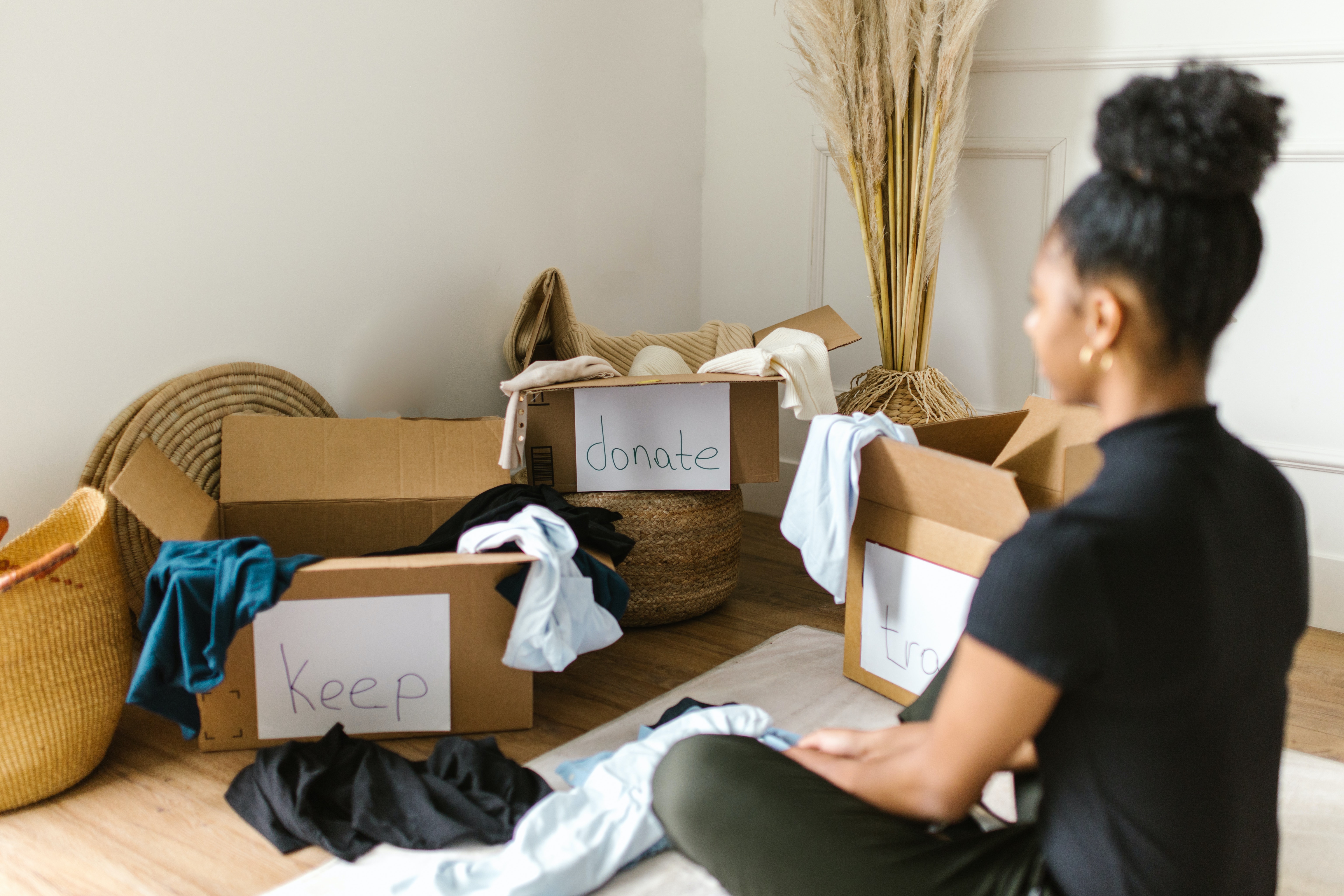
In today’s world, our lives have become inundated with things – clothes, toys, books, games, appliances, decorations, and tools – all assembled in our homes and taking up space in our lives. Even gadgets and devices meant to save us time or make life easier can add to the clutter, often forgotten or underutilized as our focus is frayed by the many demands of daily life in the modern age.
Enter the world of decluttering! Decluttering is the process through which we humans intentionally free up our lives and our living spaces from accumulating unnecessary possessions—decluttering = less mess, less stress, and an environment that promotes our ability to focus on what matters to us.
Problems with Clutter
One of the most apparent problems with clutter is stress. Overflowing drawers, stuffed closets, and strewn countertops can lead to unnecessary stress. Piles of junk can bring on all kinds of feelings, from guilt to confusion to resignation. It can be stressful to have to navigate stuff on the floor, things in the corners, to have to shove aside a pile of stuff before you can sit on the couch, or to have to spend far too long finding items lost in closets and drawers amongst old things that you never use anymore.
In addition to stress, clutter can lead to a loss of focus. Junk and clutter can be incredibly distracting and eat away at direction within the home. Every time we walk past an overflowing shelf or a cramped corner, our brains have the chance to nag us to get it organized. Frequent thoughts of ‘oh yeah, I need to get around to getting that cleaned up’ may be small and quickly passed off, but these constant low-level interruptions to what we want to focus on can interfere with what’s important to us here and now.
Cluttered, chaotic environments can be rough on children, too. Messy homes can cause stress and fray focus for kids and adults. A home environment that is riddled with clutter can be overwhelming for children. It can even result in a higher incidence of behavior problems, independent of the quality of the parent’s parenting skills*.
Benefits of Decluttering
The good news is there is a link between clutter and stress – which means that we can exercise control over the situation by engaging in decluttering. Decluttering won’t cure every anxiety or ill that comes our way, but an organized living space will minimize or eliminate clutter stress at the very least. It may even help us navigate other stress sources in our lives by providing a more freeing, comfortable, and focused home environment. When we are able to move freely through our homes without tripping on piles of junk or having to sort through drawers full of useless clutter to find that one thing we need, it becomes easier to relax.
A house with less clutter is easier and less time-consuming to keep clean and organized. When our possessions are reduced to those things most necessary and essential to us, we are better able to create a place for everything and keep everything in its place. With the time and energy that you save in keeping your house together, you will be free to do more enjoyable things, like spend time with your family or pursue goals.
Besides being less stressful and easier to maintain, one of the most cited benefits of a decluttered home is improved focus. With less mess lying around, we can relax better and focus more on the things that are important to us. A decluttered home is more visually appealing, less overwhelming, intrudes on our attention with less frequency, and can be easier and less time-consuming to keep up. Further, clutter offers constant reminders of things that need to be done – such as a broken skateboard in the corner that needs to be fixed or an unfinished craft project that needs to be finished. All of these distract our focus and impede our ability to focus on what matters most. Decluttering helps to minimize these distractions, freeing us up for what we really want to do with our time.
Decluttering also makes our homes look better. Open, tidy living space is nicer to look at and more relaxing on the eyes. We may feel more pride in our home and are less likely to feel uncomfortable if an unexpected guest drops by and sees the state of our house. A decluttered, junk-free home can also contribute to our sense of accomplishment and independence – and it should, for creating a comfortable, freeing, healthy living space is far from easy in today’s culture of materialism and hecticness.
However, a better-looking home isn’t just about aesthetics. Clutter collects dust and other allergens that may produce less than vibrant air quality. Reducing clutter reduces the total amount of surfaces on which dust can gather and makes it easier to routinely clean corners and behind, on top of, or under furniture where spills, spiders, and even more dust can collect. Reducing the dust in your home may be especially important if anyone in your family suffers from allergies or asthma.
Having less clutter can also free up our mental energy so that we can focus on our relationships with others and ourselves. Sometimes, an excess of possessions and an unwillingness to get rid of clutter stem from coping mechanisms that occur in the face of stress, anxiety, and feeling overwhelmed or unfulfilled. When we declutter, we shift our focus away from coping through possession and freeing up our time and attention so that we can focus more on building healthy relationships and engaging in other healthy, life-affirming behaviors that may help us to cope more productively with life’s difficulties.
In short, clutter messes with our stress, our focus, and even our health, while decluttering can provide a host of benefits, from stress reduction to a healthier home environment to more free time.
Where To Begin
Many people want to live an organized life, but they have no idea where to begin. I have found that if you want to remove the clutter from your entire life and begin to live an organized lifestyle, you need to begin with your home.
Start by cleaning your home. It is easier to organize a clean home than it is one that is dirty. Understandably, you will want to jump right into organizing. However, you need to take the time to clean each home room, dust, and clean the floors. Make the beds in the bedrooms and make sure anything that is still left out is put away in the correct place.
The next step is to start with the closets and drawers. Choose one bedroom and take everything out of the closet. Go through each item, separating what you wear from those you no longer wear. Next, you want to decide if the clothes you currently wear fit you properly and if they are in good condition. If you find that you are always wearing an oversized t-shirt that has bleach stains on it, you need to go ahead and get rid of it.
Take the clothes you have chosen to keep and match them up in outfits. You can create mix-and-match outfits to give even more diversity to your wardrobe, but the point is to make sure you know what will go with what and what looks good together. This will help you when it comes time to get dressed each morning. Instead of standing in front of a packed closet and trying on multiple outfits, you will already know what looks good together. Moving forward, you should only own items that fit you properly.
Next, you want to empty all of your drawers on your bed. Then, begin sorting through what you have and separating it into piles—for example, socks, pajamas, etc.
Once you have it all separated, you want to begin going through each pile and decide what you want to keep and what you want to get rid of. Ask yourself if you really need the item and if you have another item like it in better condition. For example, there is no reason to keep that set of pajamas with holes in it if you have three perfectly good sets. After you have finished up the drawers, you will want to move to your bedside table and continue this process until the entire room is clean.
If you don’t need it, get rid of it! Do you really need 13 sets of sheets when there are only 3 beds in your house? Do you need to keep all of those clothes your children have grown out of? If you cannot currently use an item you need to think about getting rid of it. If you do not want to throw items away that can be used, you can find a place to donate them or even have a yard sale and make some of your money back.
Move through your entire house, not forgetting even the smallest drawer. When you pick up an item, make a decision about whether or not to keep it in less than 5 seconds. If you have not used the item in the last 6 months you can get rid of it and not worry about missing it in the future.
Removing the clutter from your home can seem overwhelming, but you need to start small. Choose one room and then choose one section of that room to begin organizing. Remember the clutter did not accumulate in one day and you are not going to be able to remove it all in one day!
Sit down and create a plan. Choose which room you will work on each day of the week and for how long you will work on that specific room. Then you want to create a list of the areas of the room that need organized. For example, if you were trying to organize the kitchen you would list the cabinets, drawers and the refrigerator.
Make sure you give a thorough cleaning as you are organizing. Make sure you wash out the refrigerator and wash the cabinets. If you begin to feel overwhelmed, walk away from the project for a few minutes to clear your mind as well as remind yourself of your goals and how good it will feel when everything is clean and organized.

